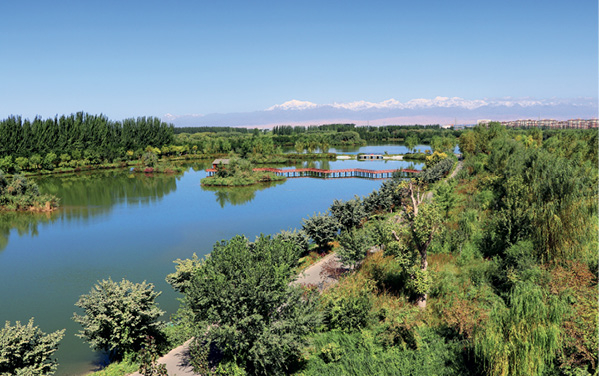
Mechanization of farming helps local people improve work efficiency by using motorized vehicles.
Yusupjan Alim would win any reality show like Survivor hands down. The 36-year-old forest ranger started his career planting trees in the bleak and blazing Gobi Desert in 2004 in circumstances entirely different from today’s.
At that time, there were no mobile phones, no GPS or transportation. The team would drive deep into the desert in a truck, carrying naans, the flatbread of Xinjiang that keeps for days. It was their staple, if not only, food.
“We lived on Xinjiang naans and water for 15-20 days while working in the desert,” Yusupjan said. “We would dip the naan into water to make it soft.” When they worked, they tied their food in a bundle around their body so that if they got separated or even lost in the hostile desert, they would still have food. Every time they went in, Yusupjan would note the way carefully so that even if he got separated from his co-workers, he could still walk out of the desert alive.
It was dangerous work but the Alim family had been doing it for several generations. Yusupjan Alim grew up in Aksu Prefecture of Xinjiang Uygur Autonomous Region in northwest China close to the Taklimakan Desert, a region which suffered from sandstorms and poverty. His grandfather and father wished their future generations would not live in a barren land, so when the place launched the Kekeya afforestation project in 1986 to plant trees and create a “great green wall” of man-made forests in the desert, they joined the millions of people taking part in the project. Influenced by them, Yusupjan also joined in when he was a teenager.
Besides combating desertification, the Kekeya green project is also protecting and restoring mountains, forests, fields, grasslands, and water bodies.
The trees Yusupjan planted three years ago have grown nearly waist-high. “When I first came here, there was only sand, no trees or birds,” he said. “Today the lush green plants give us hope.”
It is a special moment of triumph because not all the saplings that are planted survive. When a species is found to be unviable, it has to be replaced as soon as possible. It is backbreaking work, first planting the saplings and then tending to them.
In addition to planting trees, Yusupjan is also keeping bees. The 25 hives he owns fetches him honey worth RMB 20,000-30,000 a year. He feels life is changing and the labor is worth it when he watches the desert turning into an oasis thanks to the trees he and others like him have planted.
Walnuts as Cash Cow
Wensu County in Aksu is home to a state-level agricultural science and technology park. The national walnut demonstration base in the park, sprawling over nearly 940 hectares, is turning out to be a key revenue earner. Due to the unique natural conditions of the region and technological support from the Chinese Academy of Forestry, Xinjiang Academy of Forestry, and Xinjiang Academy of Agricultural Sciences, the base produces high-quality walnuts famous for their thin shells, plump kernels, and delicious taste.
Zhong Minglun has been growing walnuts here for almost 30 years with the support of the local cooperative. He remembers how the area was a desert land at that time with acute water scarcity. The local government built facilities to divert water from the melting snow of the Tianshan Mountains.
Zhong now grows walnuts on three hectares and his income is rising. “In 2022, the price of dried walnuts was RMB 12 per kilogram. After expenses, I earned RMB 70,000 in a year,” he said.
In addition to growing walnuts, Wensu is trying to build an extended walnut industry chain involving farmers, the base, and enterprises. Farmers are given free training and are supported to explore new markets. According to Guo Jinbao, deputy head of a forestry farm in Wensu, in 2022, the total revenue from walnuts crossed RMB 27 million while the revenue from walnut oil was more than RMB 30 million.
Wensu is also exploring processing walnuts. “China has a large domestic hot pot market. We are cooperating with Xinjiang Agricultural University to develop walnut sauce for hot pot,” Guo said.

An aerial view of the green project in Aksu.
 Water of Life
Water of LifeThe Aksu Dolan River Wetland Park, located southeast of Wensu, is the first national wetland park in southern Xinjiang.
The Dolan River originates from the Tianshan Mountains. In the past, its water contained a large amount of sand, and due to the gravel pits on both sides of it, the area was full of rubbish and sewage.
Jiang Feng, an official at the wetland park, said the local government carried out comprehensive restoration work to improve the environment. A lot of the effort was focused on improving the water quality through dredging, pollution prevention and de-eutrophication. Due to the efforts, the 380-hectare wetland park today has 22 lakes and has seen its water area increase from 40 percent to 60 percent.
The restored environment in turn has seen plants and wildlife flourish. There are over 140 types of green plants and over 100 types of wild animals. The wetland park is home to more than 10 types of plants under second-level state protection, such as the tamarisk and licoric; seven types of animals under first-level state protection, such as the black stork and big-head schizothoracin, a freshwater fish; and more than 20 types of birds under second-level state protection, such as the egret and heron.
“Today, there is a symphony between the water, forest, city, and residents,” Jiang said.